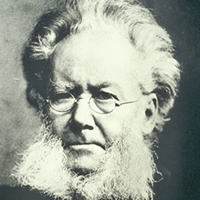A Doll's House as a Modern Tragedy
A Doll's House is a tragedy in the sense that its plot has a pattern of disintegration and a tragic ending. But the complication arises in this issue when we regard the ending from the viewpoint of Nora: is that ending a defeat for her, or is she only gaining a new vision to start living a life of dignity? Nora doesn't lose anything.

Henrik Ibsen (1828-1906)
She gains a new world, and if there is struggle and challenge, it is precisely what she wants. The play can be called a tragedy in its simple sense only if we think that her walking out of her home at night, and especially having to leave her children is something sad and undesirable. The issue becomes a debate.
A Doll's House is a tragedy in a limited sense. If we look at the events with the eyes of a traditional person, it is tragic for a woman to leave her home. Nora likes her beautiful house, her protective husband and her pretty little children. She is bound to go out into an apparently hostile world and start struggling instead of enjoying the warmth of her cozy home and her husband's embrace.
There is another way to look at the issue. Nora doesn't lose anything. She becomes free. She gains knowledge and realizes how important it is to be someone, to have the basic space and respect that every human being deserves. She becomes a free and strong woman, or at least she begins to be. The struggle is desirable, as much as life is. Dignity is a defining attribute of an individual, and one had better not live than live under the domination of a man like Helmer.
A Doll's House has been called a modern tragedy in the sense that it is not a tragedy in the traditional sense of the word, with things like 'tragic flaw' in the main character who is typically a hero. In fact, the drama does not even end in ruin, but in a new start. Old values are destroyed as the world of Nora's illusions collapse; but Nora turns out successful in our eyes, at least in gaining the powers of knowledge and courage.
There are also some traditional 'elements' of tragedy in the play. The atmosphere of the drama is tense and the tension develops relentlessly on the part of Nora, the main character. The blackmailing of Krogstad, who threatens to expose Nora's forgery in the first act, begins to make us feel anxious, like Nora. This anxiety is heightened when Nora not only starts worriedly expecting a miracle of sacrifice from her husband, but also wants to avoid it by committing suicide. The tension comes to the peak when, to her tragic disillusionment, the miracle of love and sacrifice doesn't happen. Instead of declaring that he loves his wife and damn-cares the threat of Krogstad, or instead of beating Krogstad and getting his IOU by force (like a macho, because he is trying to blackmail him), Helmer decides to treat his wife as a prisoner in his house. This climax of the drama is shocking to Nora and also to us. In such a situation, Nora decides to leave her home. That is definitely tragic because it means the collapse of her dreams.
The play is also 'tragic' in the sense that Nora is a tragic heroine. Nora grows in stature, and is purged by suffering. Having to leave her children and home, she is facing a tragic fate; but in defeat she is victorious. When everything lies in ruins around her, she emerges strong and independent as never before. At the same time her action in leaving her home points to a freer and more honest humanity in a healthier society. It is in this sense that she is a modem, the tragic heroine, and the play is a precisely what it claims to be, namely a modern tragedy. Right from the beginning the new Nora reveals herself in glimpses, grows from scene to scene, and finally stands forth as a complete figure.
The play is more simply a tragedy for Torvald Helmer. It is tragic for him because he suffers the consequence of his tragic weakness of ego, pride and falsity in his love and professed ideals. To some extent, we sympathize with this character because he has done his best so far as his society has taught him to. We should not forget that he is perhaps one of the most loving and caring husband to belong to those times. By the standards of his society, he may be laudable as a most gentle husband. But, in his tragic downfall, there is full poetic justice, like in any traditional tragic drama.
In a sense, the play is a tragedy of the traditional society. It is a tragedy for the society represented by Torvald because that society had been confidently dealing with women in that manner which it regarded as correct and just. Now that a woman has suddenly given it a blow at almost its bases — the religion, traditional values, education, the institution of marriage, and so on — the society is facing a crisis, or a tragedy. If all the women, who are of course treated no better than this, do the same, the whole of the social system would collapse. And the impact would be basically the tragic destruction of the man's basis of happiness.
A Doll's House Study Center
Signification of the Slamming of the Door in A Doll's House
Nora's Identity as a Person in A Doll's House
Parallelism and Contrast in A Doll's House
The Plot Construction in A Doll's House
A Doll's House Study Center
Introduction of A Doll's House
Detailed Summary of A Doll's House
Dramatic Irony in A Doll's House
Characterization of Mrs. Nora Helmer
A Doll's House as a Reformist Play
A Doll's House as A Feminist Play
 |
bachelorandmaster.com |